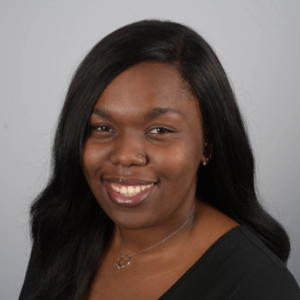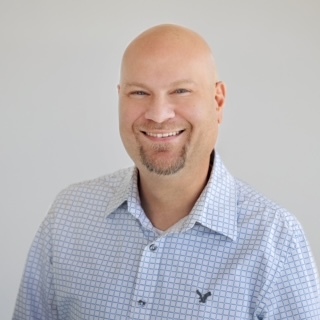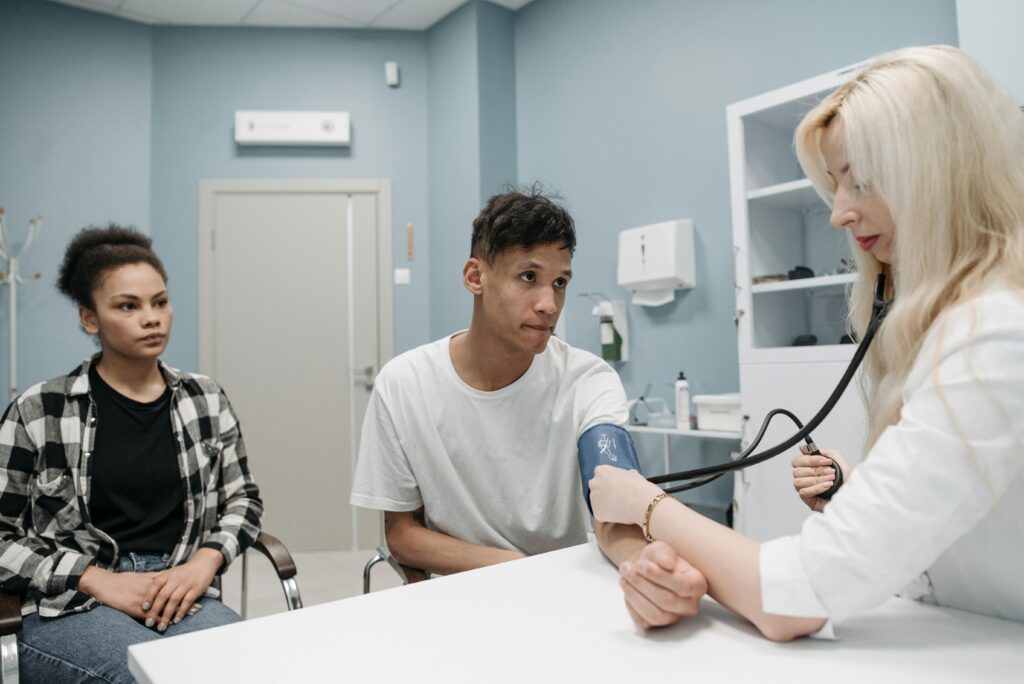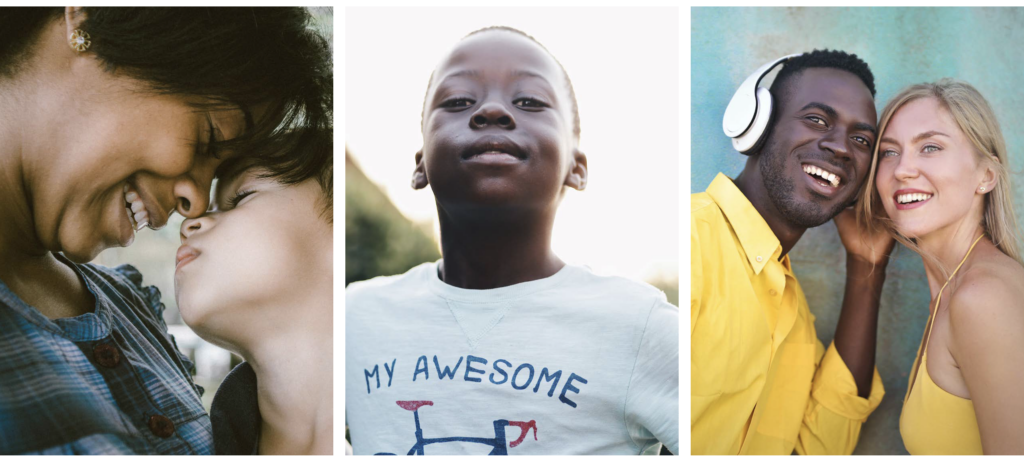
Nasaura Miles
Former Health Equity Program Analyst
“It always makes me wonder why we’re not listening to the patient when it comes to things that are beneficial to saving their life.”
Nasaura Miles knew from a young age that she wanted to work in health care. Since the age of two, she dreamed of being a heart surgeon. She wanted to save others from being dealt the same hand she was dealt after her father passed away from a heart attack—but it wasn’t until a professor introduced her to the idea of health equity that she found her true calling. Exposed to a lifetime of health inequities, Nasaura connected to the idea of health equity and made it a focus for her career. While studying for her undergraduate degree at the University of La Verne, she started her healthcare career as a behavioral therapist working with children and adults with developmental disabilities. She also worked as a Hospice Volunteer Coordinator and Patient Advocate, interacting with patients to provide them with support, companionship, and equitable care. While she pursued her master’s in healthcare administration focusing on public health in health equity, she was a recipient of the highly esteemed Randall Lewis Health and Policy Fellowship, where she worked on the toolkit Racism as a Public Health Crisis. She helped identify inequities Black people and people of color faced in San Bernardino county. This experience led her to HealthBegins which she started in March 2021 as the Health Equity Program Analyst. Here she illustrates the inequities she faced growing up, what she learned from them, and how these lessons continue to drive her to make healthcare more equitable.
When did you first recognize the reality of health inequity?
Growing up with a single mother with limited access to quality care for herself was the first example of health inequities I experienced. Beyond that example, my mother faced various complications bringing me into this world, from struggling with fertility and understanding why she had these issues to delivering me.
One of the most impactful things in my life was my mother’s passing. She passed away from breast cancer. While cancer was one of the biggest killers in my family, no genetic testing was done for her, which resulted in her being diagnosed with aggressive stage four breast cancer in her 40s which metastasized to her liver and ultimately killed her in her 50s. And so I think that if we were able to catch that early or even know if there was a genetic marker for that, such as the rare one that she had, it may have not happened. So, inequities I’ve seen are rampant, but also, I’ve seen medical racism towards me. And it’s been sad to see, but it’s our current reality that we live in.
Can you tell me about some of that medical racism that you faced?
I was going to the doctor and I was getting like some type of surgery and it wasn’t something I had to go under anesthesia for. But the biggest thing that they said was like, it was very painful and they’re saying ‘oh, you’re strong. You don’t feel this pain.’ And as we know, a lot of physicians actually think that Black people don’t feel pain. And even when it comes to women’s health things, a lot of the time I’m always told ‘oh, you’re fine, you’re fine.’ Even if it is painful to me and we already know that physicians tend to not listen to Black women when they’re in pain or things of that nature.
What life experiences shape your understanding of health equity?
I would say the whole situation with my mom passing away really made me a true advocate for health equity and then also myself, having to deal with the repercussions of that and knowing the outcomes that I could have and having to be an advocate for myself in hospital settings has really made me a champion for health equity. I just really believe in my heart of hearts that if genetic testing were done or if we were to actually talk about my mom’s family history things could have been prevented, or her cancer could have been caught sooner. But also I’ve had to advocate for myself since 18 to be able to get genetically tested. Or if I wanted to get a double mastectomy, I have to advocate for myself because they don’t want to listen to me when I’m expressing this is what I want. This is what is right for my body. This is going to save my life. And it always makes me wonder why we’re not listening to the patient when it comes to things that are beneficial to saving their life.
Tell us a little bit about the people who shaped your values.
My uncle who recently passed away Carl Thomas, he shaped my whole entire worldview on the healthcare system because he was the first Black person I ever saw in healthcare. And he was a surgical tech for over 50 years, but he had shaped my whole entire healthcare worldview. And since I was two years old, I always said, I want to be a heart surgeon. But he really pushed and pushed and pushed for me to get my education and figured out what I wanted to do in healthcare. And he was just always such a big support to me. And even providing me with like resources and people to talk to in the hospital.
I would even say just a lot of my public health professors at the University of La Verne were very supportive.
How did you decide that you wanted to make health equity your work?
I was doing my master’s course and I had this one professor named Jovita Murillo, she was an amazing professor and she actually introduced me to the term health equity, because I had known what health equity was, but I never knew the exact term for it. And so we were in class, and she’s said ‘you know, you seem really passionate about health equity. Why don’t you like specialize in that?’ And so I did a whole research on it. I minored in it. From that moment on, I dedicated myself to health equity because I knew this is in conjunction with what my life is.
What do you wish everyone else understood about health equity?
What it actually is, what it entails and how you can help implement it.
What do you do at HealthBegins?
I analyze projects across service lines while collaborating with staff, stakeholders, project partners, and subject matter experts to meet the projects’ needs. I present my findings and offer areas of improvement based upon my evaluation of the projects and processes at HealthBegins.
Also, some of the other things I do is creating resource guides, running trainings, creating standard operating practices, and helping staff with whatever technical needs they have.
What do you find challenging about your work?
I would say the most challenging thing is that I’m a person who likes to see actions just all the way and things fixed, whereas health equity is not a process that is just fixed overnight. It’s a lot of different steps and it takes a lot of work to fix something. So, I think for me the hardest thing was not being able to see that outcome right then and there.
Looking 10 years into the future. Describe what you hope to have achieved and how you hope the world will be different.
I hope that more people are willing to adopt health equity as a real thing. I hope that more people are willing to look beyond themselves and actually inform themselves on things that don’t necessarily affect them but affect others.
What advice would you offer others striving to advance health equity?
Read a lot of books. Find the niche of health equity that resonates with you the most and fight as hard as you can for it.
Describe a problem that people involved in healthcare face that you would like to solve.
Lack of time. I think when going into a hospital or going into your doctor’s appointment and your doctor’s being very rushed and you’re sitting here like ‘I have things that I want to say. I have things that are wrong with me, but you’re rushing.’ I feel like doctors are very rushed and I feel like there needs to be a point where they need to slow down. Because I think that that may lead to a lot of people not feeling comfortable going to the doctor in the essence of ‘well, I’m going to be rushed, so they’re not going to listen to me.’
I would love to educate practitioners about medical racism and how it can impact their patient’s experience in the hospital. And I think it’s important to understand the historical context of certain things. Just like I was saying previously, how a lot of practitioners don’t believe that Black people feel pain. Like that’s something that should be talked about widely. That should be something that should be debunked.
What was your first job and what did you learn from it?
My first job was at Journeys shoe store, and I actually learned that I’m really good at talking to people.
What’s a fun fact about you that many people may not know?
I drive a modified car.
What are your favorite films, books, or podcasts?
My favorite movie is the Wiz. My favorite book is 1984. My favorite podcast is Lovers and Friends by Shan Boodram.
Who inspires you?
My uncle. My mom inspires me every single day, even though she’s not here anymore. I think just her willingness to serve others and just her always being happy to serve others is something that inspires me and makes me want to do the same every day.
If you were not working in this field, what other career do you imagine having?
In a perfect world I would be a general surgeon, but in another world, I would probably be a content creator and creating informational content for young girls who grew up without parents or foster youth.
What’s one thing you’re learning now? And why is it important?
I’m learning to give myself grace and it’s important because I used to be so hard on myself and there was no room for failure for me. There was no room to mess up. And I’m learning to let go of imposter syndrome because that’s very real.
Vsem Yenovkian is the Communications Manager at HealthBegins.
Featured Content
Providing Health Equity for Immigrants in a Time of Crisis
This moment presents an opportunity for healthcare leaders to harness the national attention focused on immigrant care to build investments, policies, and protections to improve care for these communities long-term.
HealthBegins Brief: Addressing Climate Health Inequities With The Community Health Needs Assessment
This HealthBegins Policy and Practice Brief invites every healthcare organization to immediately begin addressing the impact of climate change on health at the community level and with community participation.
Immigration Enforcement in Healthcare Settings: How to Prepare and Respond
Many of our healthcare partners are asking how they should prepare for potential ICE encounters on their premises and respond in the interim to concerns among patients and staff. These questions, answers, and resources provide some guidance.




